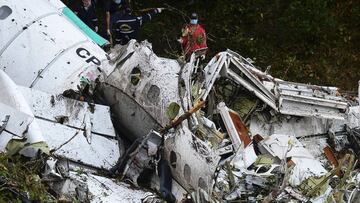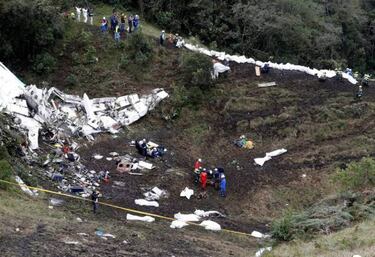Chapecoense tragedy caused by human error
Colombian aviation authorities initial report into the Chapecoense air crash finds that the plane was overweight, along with a series of human errors.

Human error caused Chapecoense crash
Errors by the pilot, airline and Bolivian regulators were to blame for a plane crash in Colombia that killed 71 people last month, including most of Brazil's Chapecoense football team, Colombian aviation authorities said today, Monday.

Lack of fuel on overweight plane
The plane, operated by Bolivia-based charter company LaMia, crashed on a wooded hillside near Medellin because the pilot failed to refuel en route and did not report engine failures caused by the lack of fuel until it was too late, officials said.
"No technical factor was part of the accident, everything involved human error, added to a management factor in the company's administration and the management and organisation of the flight plans by the authorities in Bolivia," Colombia's Secretary for Air Safety Colonel Freddy Bonilla explained to journalists.
Aviation authorities in Bolivia and the airline "accepted conditions for the flight presented in the flight plan that were unacceptable," Bonilla added.
In addition to a lack of fuel, the plane was over its weight limit by nearly 400 kilograms and was not certified to fly at the altitude at which the journey took place, Bonilla said.
Investigation backs Bolivian findings
The preliminary conclusions of Colombia's investigation coincide with assertions by Bolivian authorities last week that LaMia and the plane's pilot were directly responsible for the accident.
Pilot Miguel Quiroga was also a co-owner of the airline and was killed in the crash.
Criminal charges brought
Gustavo Vargas Gamboa, LaMia's chief executive, was jailed pending trial earlier this month on manslaughter and other charges, which he has denied.
His son Gustavo Vargas Villegas, a former official with Bolivia's aviation authority, is also being held on charges that he misused his influence in authorising the license of the plane that crashed. He also says he is innocent.
Criminal charges have also been brought against LaMia co-owner Marco Antonio Rocha Benegas, whose whereabouts are unknown, and air traffic controller Celia Castedo, who fled Bolivia after the crash and is seeking asylum in Brazil.
Bolivian authorities have said the crash was an isolated incident, but that the government will accelerate the process of implementing a new safety system. Colombian investigators have the final word on causes of the crash, Bolivian authorities have said.
Biggest game in Chapecoense history
The aircraft had been transporting the Chapecoense team to the biggest game in its history, the final of the Copa Sudamericana.
Related stories
All but three of the players and staff onboard were killed in the tragedy. Two crew members and one reporter also survived.